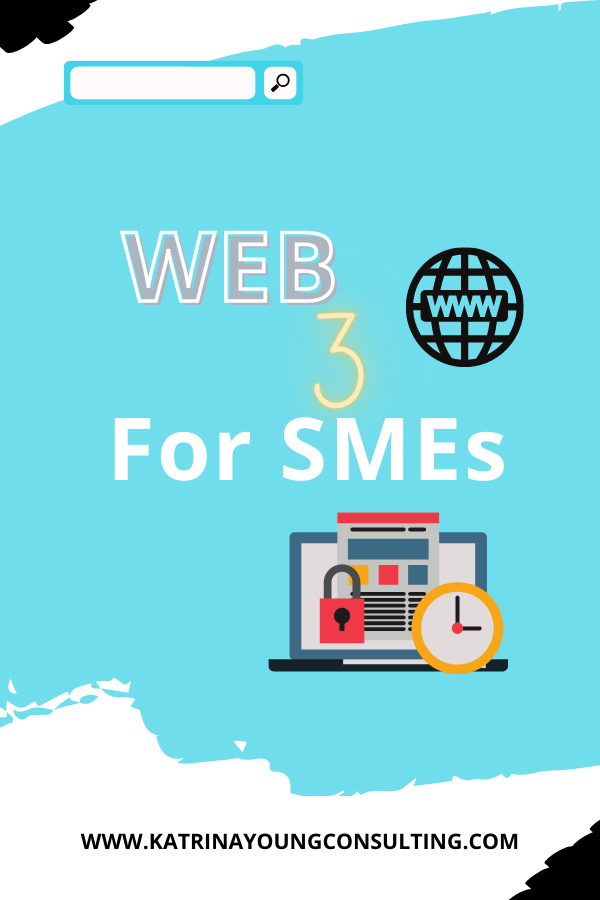Web 3 for SME's - What is Web 3.0?
What is Web 3.0?
“Web 3.0 is an umbrella concept for the next generation web, which leverages emerging technologies like artificial intelligence and machine learning to provide a more intuitive, contextualised, customised and personalised experience on the internet."
Web 3.0 is the fifth generation of internet technologies that makes possible the development of the global system of interconnected computer networks, using commonly accepted standards and communications protocols.
Web 3.0 is a broad term for many different applications that are in use today. As a very general overview, web 3.0 technologies can be described as enabling semantic web and machine-readable information. For example, instead of having data stored in a database somewhere and presented to human users on the front end, web 3.0 allows machines to access these databases directly to perform tasks without needing a human intermediary on the front end.
Web 3.0 is the third generation of web evolution. It refers to the growth of intelligent, programmable, semantically aware web services that obtain knowledge from the open linked web and make decisions by predicting a user's needs.
Web 3.0: What You Need to Know About the Next Generation Web
The internet is about to change drastically. Web 3.0, or the Semantic Web, is coming, and it has major implications for all of us. For one thing, we’ll soon have access to more information than ever before. The Semantic Web will be fueled by Artificial Intelligence (AI). This includes robots and smarter computers that can automate things like translation, language processing, and data analysis. With the help of AI, the web will become a lot more interactive and self-aware. There are plenty of ways for you to get ready for the next generation web!
What is Web 3.0?
Web 3.0 is the next generation of the web, also known as the Semantic Web. The term was first coined by scientist Tim Berners-Lee in 2001, who envisioned a web where data is linked and interconnected, rather than stored in isolated silos.
>> As a result, information would be more easily accessible (or "linked") to other data and people could better understand how it relates to them - what it might mean for their lives or the world around them.
How does it work?
The Semantic Web is a form of web that relies heavily on AI. It will change the way we interact with the internet and how it interacts with us. You’ll be able to find what you’re looking for easier than ever before. For example, when you type something into Google search engine, it will return answers based on what you’ve searched for in addition to links to other informative sites.
Another example of the next generation web is voice-activated technologies like Siri and Alexa. These technologies are already changing how we interact with technology, but they’re just scratching the surface of what they can do in the future.
The Semantic Web will accommodate all forms of communication—written, verbal, and visual. The web will be more personalized because it will remember your preferences (like what language you speak) and most visited sites. With this information, the Semantic Web can anticipate your needs and provide you with relevant information right away.
According to Wokepedia - Semantic Web - The Semantic Web, sometimes known as Web 3.0, is an extension of the World Wide Web through standards set by the World Wide Web Consortium. The goal of the Semantic Web is to make Internet data machine-readable. - https://en.wikipedia.org/source
The Semantic Web will make things easier for users. It will also save time and energy for website owners by automating processes like translation or data analysis without relying on humans to do so. This means websites will have less downtime due to human error which should improve the responsiveness of sites as well as decrease costs related to labor that would normally be needed for these tasks.
There are many implications for our future lives in an age of Web 3.0 but one thing is certain: The changes
Web 3.0 is a hypothetical successor to the World Wide Web as we know it. It represents a hypothetical future redesign of the web, where software agents carry out most of the tasks currently performed by human users.
Web 3.0 is the future of the internet where it can recognise the user and their device via a persistent authentication scheme, while also understanding their intents, goals, context and status.
Web 3.0 is a set of enhanced web standards and protocols aimed at enhancing user experience by providing better ways to access and present a range of information.
Why should you care about Web 3.0?
As the internet changes, we’ll all have to change with it. Web 3.0 is coming, and that means a whole new way of browsing the internet. Web 3.0 will be fueled by Artificial Intelligence (AI). AI includes robots and smarter computers that can automate things like translation, language processing, and data analysis. With the help of AI, the web will become a lot more interactive and self-aware.
Web 3.0 will mean a better experience for those who browse the internet because it will be tailored specifically for the user’s needs. This information is pulled from various sources based on what you do online. For example, if you frequently visit cooking websites, content about food preparation might start popping up on your Facebook feed or in your Google search results pages to keep you in the loop about new recipes or cooking tips from other websites you’ve visited in the past.
What can you do to prepare for the future web?
The web is about to change. Web 3.0, or the Semantic Web, is coming, and it has major implications for all of us. For one thing, we’ll soon have access to more information than ever before. The Semantic Web will be fueled by Artificial Intelligence (AI). This includes robots and smarter computers that can automate things like translation, language processing, and data analysis. With the help of AI, the web will become a lot more interactive and self-aware.
Here are some things you can do to prepare for the future web:
* Think critically about your goals as a business. What makes your company unique? What sets you apart from competitors? How would you like your business to develop in the next decade?
* Consider how digital technology is affecting your industry specifically. As an example, what new tools could your company use to take advantage of this emerging trend?
* Learn and understand the capabilities of AI technologies. You should know what they are capable of doing and what they are not capable of doing so that you can make informed decisions about how you want to use them within your business
* Determine whether or not it’s worth investing in AI technologies for both short-term gains as well as long-term strategic planning
Conclusion
There is a lot of talk about Web 3.0, but what does it really mean for you?
You will see changes in the way you search for information and find content online. The way you engage with social media will change as well. But what does this all mean? Web 3.0 is the future of the web, and it is coming soon.
Think about what you can do to prepare for the future web. Maybe it’s time to hire a digital marketing agency in order to stay ahead of the competition. Or maybe it’s time to start making a shift in your marketing strategy in order to stay relevant. Either way, if you are not ready for Web 3.0, you will be left behind.
How are you adopting Web for your SME?







